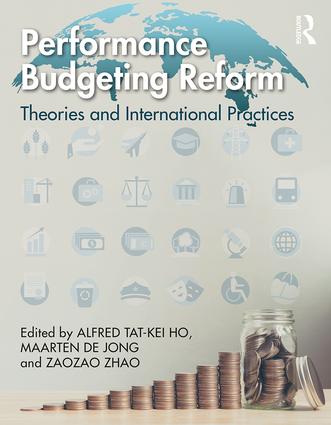

[Abstract]
Using theoretical frameworks to explore the political, organizational, and cultural dynamics of performance budgeting, this book examines the adoption of performance budgeting in a variety of countries, how it has been implemented, and why it succeeded or failed. Chapters include case studies from a wide range of continents and regions including the U.S., Africa, Asia, Australia, Europe, Latin America, and the Middle East. Each case study pays careful attention to the unique historical, political, and cultural contexts of reform and closely examines how performance informed the budgetary process.
Chapters investigate theory-driven analysis, focusing on common themes related to international policy diffusion, organizational change, stakeholder politics and gaming, communication and information management, principal–agent dynamics, and institutional constraints. Contributors include both scholars and seasoned practitioners with extensive experience in implementing or advising performance budgeting reforms. With emphases on both theories and practices, this book is written for graduate courses in public budgeting and comparative public administration, providing theoretical insights into budgeting reforms in developing countries, as well as practice-relevant and actionable recommendations for current and future policymakers and budget reformers.
[Contents]
List of figures
List of tables
List of contributors
Section I. Theories of Performance Budgeting
1. Rethinking Performance Budgeting: Presumed Dead or Alive and Well?
Alfred T. Ho, University of Kansas, USA and Maarten de Jong, VU University Amsterdam, the Netherlands
2. Six Theoretical Perspectives on Performance Budgeting
Alfred T. Ho, University of Kansas, USA
3. Budget Reform Dynamics and Conceptualization of Reform Space
Maarten de Jong, VU University Amsterdam, the Netherlands
Section II. Synthesizing Lessons from High-Income Countries
4. Performance Budgeting in the U.S: A Long History of Institutional Change
Alfred T. Ho, University of Kansas, USA
5. The Evolution of Performance Budgeting amidst Other Public Financial Management Reforms in Australia and the Netherlands
Andrew Podger, Australia National University, Australia, and Maarten de Jong, VU University Amsterdam, the Netherlands
6. Linking Strategic National Planning with Performance-Based Budgeting: Republic of Korea Under the Developmental-State Era
Tobin Im and Jay H. Kwon, Seoul National University, South Korea
7. Lessons about Integrating Performance with Budgeting in High-Income Countries: An Evolving Exercise
Maarten de Jong, VU University Amsterdam, the Netherlands, and Alfred T. Ho, University of Kansas, USA
Section III. Synthesizing Lessons from Low and Middle-Income Countries
8. The Long History of Performance Budgeting in the Philippines
Mary Venner, University of Canberra, Australia
9. Performance-based Budgeting System and Performance Evaluation in Mexico
Edgar E. Romirez and Gabriel Puron-Cid, Center for Research and Teaching in Economics (CIDE), Mexico
10. The Evolution of Performance Budgeting Reform in Chile
Juan Pablo Martínez Guzmán, University of Maryland, USA
11. Performance Budgeting Reform in Indonesia: Brief History, Progress, and Lessons Learned
Aichiro Suryo Prabowo, University of Indonesia, Indonesia
12. The Evolution of Performance Budgeting Initiative in Guangdong, China
Wenbin Li, South China University of Technology, China
13. Performance Budgeting Reform of a Chinese City: The Roles of External Pressure and Leadership
Zaozao Zhao, the National Academy of Economic Strategy, the Chinese Academy of Social Sciences, PRC and Alfred T. Ho, University of Kansas, USA
14. Third-Party Evaluation and Performance Budgeting Reform: A Chinese Case Study
Zaozao Zhao, the Chinese Academy of Social Sciences, and Wen Fan, Dataway Horizon, China
15. Performance Budgeting in Kenya: Challenges of Institutional Change and Communication Processes
Frankline Muthomi and Kurt Thurmaier, Northern Illinois University, USA
16. Performance Budgeting Reform in Tunisia
Maarten de Jong, VU University Amsterdam, the Netherlands
17. Performance Budgeting Challenges in Developing Countries: A Case Study of Afghanistan
Mary Venner, University of Canberra, Australia
18. Lessons for Low- and Middle-Income Countries: Right-Sizing the Reform
Alfred T. Ho, University of Kansas, USA, and Maarten de Jong, VU University Amsterdam, the Netherlands
Section IV. The Future of Performance Budgeting Reform
19. From Practice to Theory: The Future of Performance Budgeting Research
Alfred T. Ho, University of Kansas, USA, and Maarten de Jong, VU University Amsterdam, the Netherlands
20. Tools of Performance Budgeting: Applying the Lessons Learned
Maarten de Jong, VU University Amsterdam, the Netherlands, and Alfred T. Ho, University of Kansas, USA